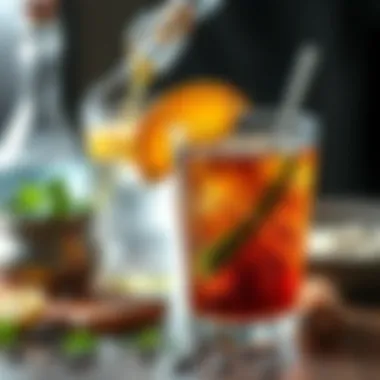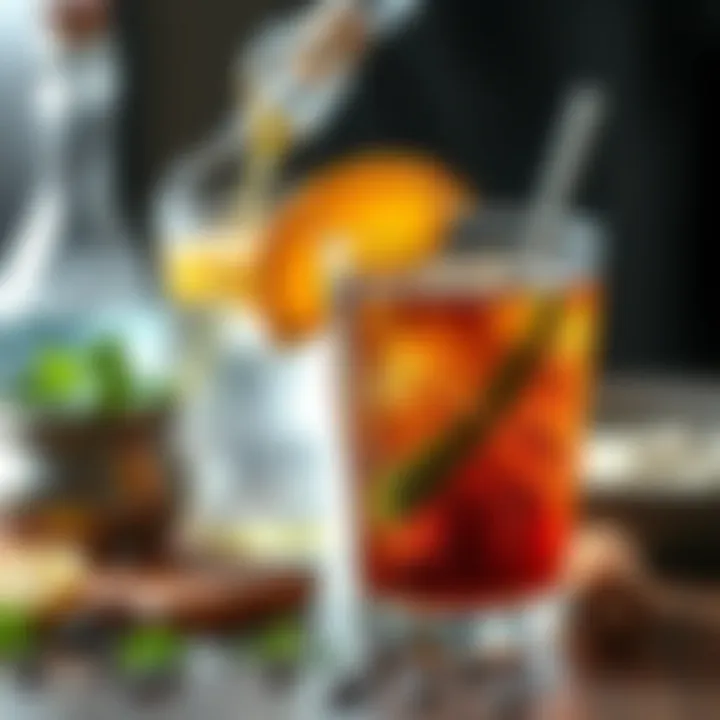Quick Ways to Relieve Hangover Symptoms Effectively


Intro
Navigating the aftermath of a night filled with drinks can feel like wandering through a fog. The classic hangover symptoms, ranging from pounding headaches to nausea, often come crashing down harder than expected. It’s not just the throbbing temples that hurt; it’s also the wasted day that follows such indulgence. Understanding the strategies to alleviate these uncomfortable feelings can make a world of difference.
While there’s no magic bullet to erase a hangover completely, there are effective methods that can significantly ease the symptoms. By focusing on hydration, nutrition, and some practical remedies, you can find your way back to feeling yourself again.
In this article, we’ll break down how to tackle hangover symptoms head-on, shedding light on techniques that are backed by science and have stood the test of time. You'll discover not only the importance of certain foods and drinks but also the benefits of hydration and lifestyle adjustments. From simple hydration strategies to specific nutrients that work wonders, this guide will arm you with the knowledge needed to tackle hangovers with both wit and wisdom.
Understanding Hangovers
Grasping the essence of hangovers is pivotal if one wishes to navigate the often treacherous waters of post-drinking recovery. Hangovers, while seemingly trivial to some, can significantly affect one's physical and mental state. Educating ourselves about the causes and recognition of hangover symptoms empowers individuals to take swift action toward recovery. This knowledge creates a foundation for effective remedy strategies and emphasizes the significance of responsible drinking.
What Causes a Hangover?
At its core, a hangover is the body's response to the excess consumption of alcohol—an intoxication that leaves behind a trail of physiological havoc. Delving deeper into the science, the body reacts to alcohol as a toxin, triggering a series of responses. One primary culprit is dehydration; alcohol inhibits the secretion of the anti-diuretic hormone, leading to increased urine production. This depletion of fluids is often what first strikes at dawn the next day.
Additionally, the breakdown of alcohol generates acetaldehyde, a toxic byproduct that can evoke feelings of nausea and vomiting. Coupled with that, the congeners found in darker spirits, like bourbon and red wine, can intensify hangover symptoms compared to clearer liquors. Toss in factors like lack of sleep, poor nutrition, and individual variations in metabolism, and you have a perfect storm of discomfort waiting for the unsuspecting drinker.
Common Symptoms of Hangovers
When the sun creeps over the horizon, the signs of a hangover can come knocking at your door loud and clear. Common symptoms include:
- Headaches: Often likened to a jackhammer inside your skull, headaches can range from mildly annoying to utterly debilitating.
- Nausea: The queasiness that leaves you feeling as if the room is spinning, sometimes accompanied by actual vomiting.
- Fatigue: An overwhelming sense of tiredness can prevail, leaving one sluggish and unmotivated.
- Dry Mouth and Thirst: As dehydration sets in, the parched throat becomes a glaring reminder of the previous night’s indulgences.
- Sensitivity to Light and Sound: The world feels more intense than usual, making even the soft glow of a lamp a source of irritation.
"As much as we may enjoy parts of the drinking experience, hangovers remind us of the fragility of our bodies and the necessity for self-care."
Understanding these symptoms not only helps in identifying a hangover but also guides individuals in selecting targeted strategies for relief. The knowledge acquired here will serve as a solid base as we move forward into more actionable recovery techniques.
Immediate Relief Strategies
When the aftermath of a night out looms large, it’s vital to have immediate relief strategies ready to tackle hangover symptoms head-on. These strategies mainly revolve around rehydration and replenishing lost vital nutrients. Ignoring these might prolong discomfort and leave one feeling like they’ve been hit by a freight train. It’s about acting fast and effectively to snatch back your day from the clutches of a hangover.
Hydration: The Key to Recovery
The first order of business when dealing with a hangover is hydration. Alcohol serves as a diuretic, leading to fluid loss and contributing significantly to dehydration, which often manifests as headaches and fatigue. Therefore, drinking water is essential. Aim to sip water regularly, rather than gulping it down all at once, which may overwhelm a sensitive stomach.
A few notable tips for hydration include:
- Electrolyte drinks: Consider drinks that contain electrolytes. These concoctions are specifically designed to replace what your body has lost. Brands like Gatorade or coconut water can do wonders.
- Infused water: If plain water feels too dull, try infusing it with fruits or herbs. Lemon, cucumber, or mint can add a refreshing twist and may aid in digestion as well.
- Broth-based soups: Besides being hydrating, a warm broth can also provide nutrients and help settle the stomach. Chicken or vegetable broth can be an excellent choice.
Incorporating these hydration strategies can be a game-changer, improving your chances of feeling somewhat human again.
Electrolytes: A Crucial Component
Electrolytes play a pivotal role in recovery from a hangover. These minerals, which include sodium, potassium, and magnesium, are crucial for regulating fluid balance in our bodies. During drinking, these can be severely depleted, leaving one feeling sluggish and frail.


To effectively replenish electrolytes after a long night of drinking, try incorporating some of these options into your recovery:
- Sports drinks: Sports drinks can be beneficial due to their balance of electrolytes and hydration. Just be cautious about added sugars that can exacerbate nausea.
- Bananas: Often dubbed nature’s sports drink, bananas are rich in potassium, which can be particularly helpful in restoring balance.
- Salted snacks: Eating something salty like pretzels or peanuts can be high in sodium, which can help you hold onto more water, thus alleviating some symptoms of dehydration.
In synthesis, paying attention to hydration and electrolytes not only kick-starts the recovery process but also might make one feel more energized and ready to conquer the day again.
"Hydration and electrolytes are not just buzzwords; they are the lifeline when navigating the ups and downs of a hangover."
For further reading on hydration and its importance, you can visit Wikipedia or improve your knowledge through Britannica.
Following these immediate relief strategies will set the stage for a smoother recovery, erasing the fog of the previous evening’s escapades.
Nutritional Interventions
When it comes to shrugging off a hangover quickly, nutritional interventions play a pivotal role. The foods we consume can either aid our recovery or exacerbate our discomfort. Understanding what to eat and what to avoid is crucial for a speedy rebound from the post-drinking blues. After indulging in alcohol, the body craves certain nutrients to heal and restore itself.
Foods to Avoid Post-Drinking
Certain foods can do more harm than good when recovering from a hangover. Here’s a quick rundown of what to steer clear of:
- Greasy Foods: While many swear by a greasy breakfast, heavy, fatty foods can actually make digestion sluggish and exacerbate nausea. Think twice before digging into those fried eggs and bacon strips.
- Sugary Treats: High sugar foods may sound tempting, but they can offer only a brief sugar rush followed by a crash—leaving you feeling even more drained.
- Caffeine: Coffee and energy drinks might be a go-to for a quick pick-me-up. However, caffeine can complicate hydration and lead to increased dehydration, making your hangover worse in the long run.
In essence, consuming these items may feel like adding fuel to the fire. While they might offer temporary satisfaction, they often don't address the underlying dehydration and nutrient depletion caused by alcohol.
The Best Foods for Hangover Recovery
In stark contrast, certain foods can work wonders in alleviating hangover symptoms. To maximize recovery, consider incorporating these into your diet:
- Bananas: Rich in potassium, bananas are great for replenishing electrolytes lost during drinking. They are also easy on the stomach and can help with nausea.
- Eggs: Packed with protein and containing cysteine, a compound that can help break down acetaldehyde (a toxic by-product of alcohol metabolism), eggs can serve as a hearty dish to kickstart your recovery.
- Oats: A warm bowl of oatmeal can soothe the stomach, while also providing carbohydrates to boost energy levels. The fiber in oats helps maintain stable blood sugar levels, combating fatigue.
- Ginger: Ginger tea or even raw ginger root can ease nausea, serving as a natural remedy to settle an upset stomach.
- Chicken Soup: This comfort food is not just for colds. It's filled with hydration and essential minerals, making it possibly one of the best soul-saving dishes when you're feeling under the weather after drinking.
Herbal Remedies and Supplements
When it comes to tackling hangovers, many often look beyond traditional methods and explore herbal remedies and supplements. These natural options have been used for ages, often steeped in culture and tradition, to soothe the body and mind after overindulgence. Incorporating these strategies can enhance recovery and bring about a sense of normalcy sooner rather than later. The benefits of these remedies go hand in hand with the body's need for replenishment and balance, addressing not just the symptoms but also promoting overall well-being.
Ginger: A Natural Soother
It's hard to overstate the power of ginger. This humble root serves as a potent ally against many ailments, including hangovers. It contains antioxidants and anti-inflammatory properties that can help alleviate nausea, which is often a byproduct of heavy drinking. You might find that ginger tea is a soothing way to ease your stomach and calm any queasy feelings. A little sliced ginger steeped in hot water or even ginger ale can work wonders.
When consumed, ginger acts as a digestive aid that helps the body process any toxins left behind by alcohol. Some studies suggest that it can even enhance gastric motility. Just don’t go overboard; a little is usually enough to quietly soothe your insides without stirring the pot too much. As the saying goes, "less is more."
"A little ginger goes a long way; sometimes, it’s the small things that have the big impact."
Peppermint and Its Benefits
Peppermint is another herbal remedy worth considering. Often recognized for its refreshing flavor, peppermint tea has long been used to ease stomach discomfort and headaches. The menthol found in peppermint leaves can help relax the muscles in the gastrointestinal tract, giving some relief to the bloating that often accompanies a hangover.
Moreover, peppermint’s cooling sensation helps in alleviating headaches, a common affliction due to dehydration and the effects of alcohol. Sipping on a warm cup or even just chewing on peppermint leaves can become a simple yet effective ritual during recovery. This not only invigorates your senses but also sharpens your focus, helping you shake off that hangover fog.


The Role of Vitamin B and
Vitamins play a pivotal role in supporting recovery from hangover symptoms. Vitamin B complex, including B1, B6, and B12, can enhance your energy levels and help your body metabolize alcohol more effectively. These vitamins are vital in processing the alcohol that lingers in your system and minimizing fatigue, often leaving you feeling fresher without the brain fog.
On the other hand, Vitamin C is a powerful antioxidant that can combat inflammation and promote a stronger immune response. Citrus fruits like oranges or kiwis are excellent sources of Vitamin C; a simple smoothie or fresh juice can not only replenish lost nutrients but also hydrate your body. This nutrient combo acts as a protective shield, aiding in the repair and recovery of your body.
Engaging with these herbal remedies and supplements doesn’t have to be daunting. It's all about making these natural options a part of your hangover recovery toolkit. All in all, the right herbs and vitamins can make a tangible difference, helping you get back on your feet and feel more like yourself in no time.
Rest and Recovery
When tackling the aftermath of a hangover, few strategies hold as much weight as a solid focus on rest and recovery. While quick fixes might offer immediate relief, allowing the body to recuperate serves as a crucial foundation for overall healing. Sleep acts like a reset button; it gives the body essential time to repair itself, manage inflammation, and restore balance.
Importance of Sleep
There's an old saying that goes, "Sleep is the best meditation." This couldn’t be more accurate, especially after a night of revelry. Alcohol disrupts your sleep cycle, often leading to fragmented rest that leaves you feeling even more drained. Prioritizing quality sleep post-drinking is non-negotiable.
Here's why:
- Physical Recovery: During sleep, the body gets busy repairing tissues, balancing hormones, and even detoxifying itself. This is the gift of sleep; it helps clear out the fog that a hangover creates.
- Cognitive Restoration: After a night spent indulging, your cognitive function might feel utterly shot. Sleep rejuvenates mental clarity, helping you to think straight and make sound judgments.
- Mood Improvement: A well-rested individual tends to have a sunnier disposition. Conversely, lack of sleep can magnify feelings of irritability or anxiety, magnifying the effects of a hangover.
If you can, try to carve out a little extra snooze time the following day. Even a brief nap can work wonders.
Light Exercise: Do’s and Don’ts
Contrary to what you might think, hitting the gym hard isn’t the best way to shake off a hangover. Light exercise can, in fact, be beneficial, but there’s a fine line between helpful and harmful. Here are some guidelines to consider:
Do’s:
- Gentle Stretching: Engage in stretching or yoga. These activities promote blood flow and can alleviate muscle tension, leaving you feeling more relaxed and revitalized.
- Go for a Walk: A leisurely walk can stimulate circulation, which may help lift your spirits without adding undue stress on your body.
- Listen to Your Body: If you're feeling up to it, light activities can provide some relief. However, if you're feeling faint or dizzy, take it easy and rest.
Don’ts:
- Avoid Intense Workouts: High-impact exercise or heavy lifting can drain your energy reserves—something you're likely low on after a night of drinking.
- Don't Overexert Yourself: You don't want to push your body to its limits. The idea here is to aid recovery, not hinder it.
In summary, rest and recovery is essential when tackling hangovers. Giving your body the time and space it needs to recuperate will ultimately lead to a quicker and more effective recovery. Both sleep and a careful approach to light activity work in tandem to help you rise from the fog of a hangover stronger and ready to face the day.
Preventive Measures
When it comes to alleviating hangover symptoms, prevention is often the unsung hero. Focusing on preventive measures can significantly lower the chances of waking up feeling like a train wreck after a night out. These strategies, if woven thoughtfully into one's drinking habits, may save you from the misery of congestion, nausea, and fatigue the next morning.
Drinking Responsibly
Drinking responsibly cannot be overstated. It’s not just about limiting your intake; it’s about being mindful of how to enjoy your drinks without the aftermath. Keeping track of how much you're consuming is crucial. A good rule of thumb is to limit yourself to two standard drinks an hour and ensuring that you’re well acquainted with your body’s limits. A salty night out can lead to an even saltier morning, so aim to have a glass of water between each cocktail you sip.
Additionally, understanding your drink of choice also matters. Some spirits are more congenial than others; for instance, lighter-colored drinks like vodka tend to create fewer hangover woes compared to darker options like whiskey or red wine, which can lead to more severe next-day consequences. Choose wisely, and it might save you from disaster.


The Role of Food Before Drinking
What you consume prior to imbibing alcoholic beverages plays a fundamental role in hangover prevention. Eating a meal rich in healthy fats and proteins, such as eggs and avocado, forms a protective buffer in your stomach. This slows down alcohol absorption, allowing your body time to process it more gradually.
Some effective food options could include:
- Avocado Toast: Packed with healthy fats, it’s a delightful buffer for your stomach.
- Whole Grains: Brown rice or quinoa provide essential carbs that help stabilize blood sugar levels.
- Bananas: They are not just tasty but also rich in potassium, which can aid in avoiding cramping and fatigue.
It's not just about what you eat but also how much. A heavy meal might slow down alcohol absorption but can also make you sluggish. Two sides of the same coin, it’s a balancing act you need to master. Just remember, don't drink on an empty stomach; that’s a surefire way to wake up wondering what hit you.
A well-prepared meal can equip you better for battles with a hangover.
In summary, preventive measures lay a sturdy foundation for avoiding hangovers in the first place. Thoughtfulness in how much, what, and when you drink, coupled with strategic eating, can make all the difference between a delightful evening with friends and a painful 9 AM recovery. Following these essential steps won’t guarantee you’ll dodge the hangover entirely, but it might just ensure that come morning, you can rise and shine instead of merely rise.
When to Seek Medical Help
Recognizing when a hangover might escalate into something more serious is a vital aspect of handling alcohol-induced discomfort. While most hangovers can be managed at home with hydration, rest, and some nourishing food, there are instances when medical intervention becomes necessary. Knowing when to seek help can prevent complications and ensure a quicker recovery.
Severe Symptoms to Monitor
It's essential to watch for signs that indicate a hangover may be more than just a typical aftermath of a night out. Some severe symptoms that ought to trigger immediate medical attention include:
- Extreme confusion or disorientation: If someone appears confused about their surroundings or identity, it can signal a severe withdrawal or alcohol poisoning situation.
- Persistent vomiting: While a bit of nausea is common in hangovers, continuous vomiting can lead to dehydration or even a more severe condition known as 'alcoholic ketoacidosis.'
- Severe headache or migraines: An ordinary headache is expected, but if the pain is debilitating, you should definitely consult a healthcare professional.
- Seizures: This is a rare, but critical event that warrants immediate medical attention and shouldn’t be ignored.
- Breathing difficulties: Any trouble breathing or unusually slow or irregular breathing could be a serious concern, possibly indicating an overdose situation.
- Cold or clammy skin: These symptoms might suggest hypothermia or shock, which are life-threatening conditions.
If you’re unsure whether medical help is needed, it’s always safer to err on the side of caution. When in doubt, seek help.
Remember: Your health is paramount, and seeking assistance is not a sign of weakness but rather a responsible decision.
Long-term Effects of Excessive Drinking
Engaging in excessive drinking routinely can lead to a cavalcade of long-term health issues that extend far beyond the occasional hangover. The impact on physical health as well as mental well-being can be profound:
- Liver Damage: Prolonged alcohol use can result in fatty liver, hepatitis, or even cirrhosis, which are serious and potentially life-threatening conditions.
- Heart Problems: Heavy drinking could lead to high blood pressure, irregular heartbeats, and even cardiomyopathy, which affects the heart muscle’s ability to pump blood.
- Mental Health Issues: Chronic alcohol consumption is associated with anxiety, depression, and even more severe psychiatric disorders.
- Digestive Problems: The gastrointestinal tract takes a hit too, with an increased risk of gastritis, reflux issues, and other chronic conditions.
- Dependency and Addiction: What starts as casual drinking can develop into dependence, requiring professional intervention and recovery support.
Monitoring your drinking habits and understanding their long-term implications is crucial. Awareness and education about the risks can pave the way for making informed decisions and foster a healthier lifestyle.
Finale
Understanding how to effectively deal with hangover symptoms is essential for anyone who enjoys social drinking. This article has provided a thorough overview of varied strategies aimed at easing the discomfort that often follows a night of indulgence. The focus on hydration, nutrition, and responsible drinking underscores the importance of preparation and recovery.
Summary of Effective Strategies
To recap, several key strategies have been outlined to help alleviate hangover symptoms quickly:
- Hydration: Drinking plenty of water and electrolyte-infused beverages can expedite recovery. Alcohol dehydrates the body, so replenishing fluids is paramount.
- Nutritional Interventions: Eating the right foods, such as bananas or eggs, can replenish lost nutrients, while avoiding heavy, greasy meals can prevent further digestive distress.
- Herbal Remedies: Incorporating ginger or peppermint can provide relief for nausea and headache.
- Rest: Don’t underestimate the power of a good nap. Allowing the body to recharge is crucial.
- Preventative Measures: Going forward, adopting measures like drinking responsibly and consuming food before drinking can greatly reduce the risk of severe hangovers.
This holistic approach not only addresses immediate discomfort but also fosters healthier drinking habits over time. By remembering these strategies, you can better prepare for social events and manage the aftermath more effectively.
Encouragement for Responsible Drinking
While it’s tempting to indulge during festivities, moderation is the key to enjoying drinks without the dreaded hangover. Understanding your limits and pacing yourself can go a long way.
- Plan Ahead: If you know a social gathering is on the horizon, consider eating a substantial meal beforehand and making sure to stay hydrated.
- Set Limits: Knowing how many drinks are too many is vital. Stick to a number that keeps you feeling good.
- Mix Wisely: Opt for lighter spirits or choose drinks with lower alcohol content to help keep your hangover at bay.















